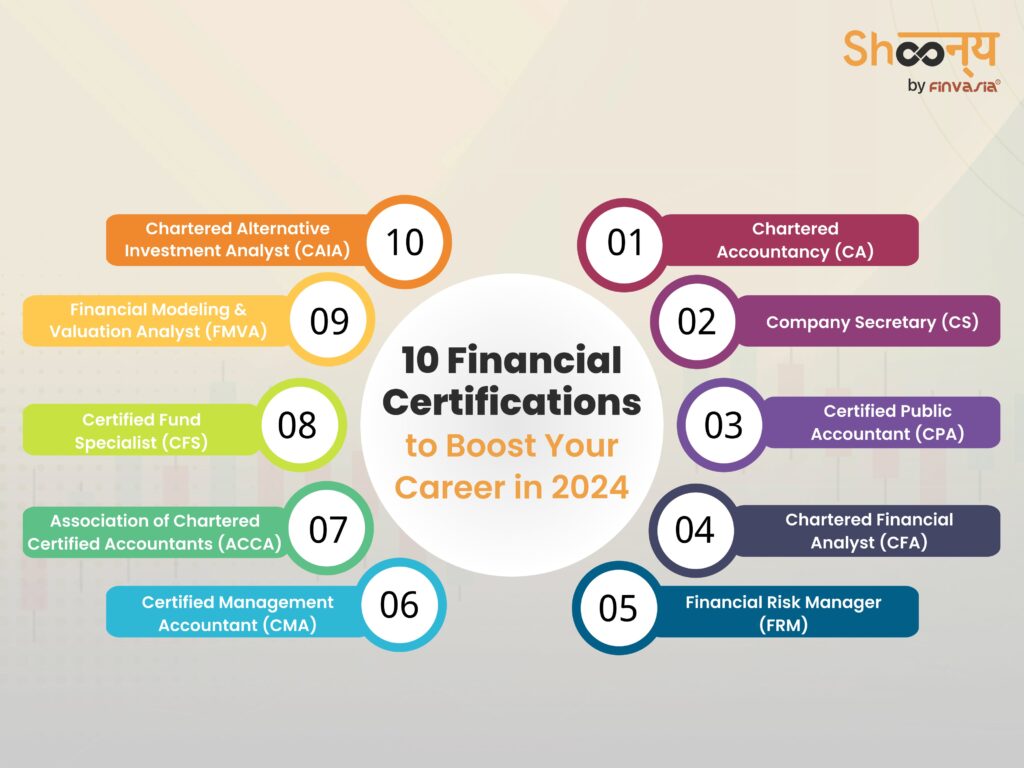Essential Finance Certifications for Career Growth – 2024

With technology changing the finance and banking sectors, there’s a big push for innovation. As India aims to become a fully digital nation by 2047, initiatives like Digital India are driving growth. Areas like fintech, portfolio management, financial analysis, and wealth management are expanding quickly. With the demand for finance experts on the rise globally, it’s important to stand out. To keep up and get ahead, specialised financial certifications can really help you grow in your career and grab opportunities in these sectors.
We’ve put together a list of financial certifications to help you discover what interests you and learn more about different finance fields.
It’s time to advance in your career with these financial certifications.
Let’s introduce you to the top 10 finance certifications in 2024!

Financial Certifications and Finance Certificate Programs
Financial certifications are key for anyone looking to advance in the finance world. They prove your skills, boost your credibility, and often lead to better pay. Certifications like CFA, CA, and CPA offer specialised knowledge that employers highly value. Not only this but most of the finance professional certifications are recognised worldwide. You can definitely gain an edge in the competitive job market. Earning these finance certificate program credentials shows your dedication to growing professionally.
To help you take the next step in your career, here’s a list of the best finance certifications for beginners.
1. Chartered Accountancy (CA)
CA is a prestigious finance professional certification offered by the Institute of Chartered Accountants of India (ICAI). It’s one of the most respected qualifications in India.
CA certification opens doors to various career opportunities in accounting, auditing, and consulting. Most commerce students tend to opt for this course right after completing their plus 2 class.
To become a Chartered Accountant (CA) in India, you must follow this:
- Register for CA Foundation: After finishing your 12th, sign up for the CA Foundation course through ICAI. This is the first step.
- Pass the CA Foundation Exam: Study and clear the Foundation exam, which includes subjects like accounting and economics.
- Register for CA Intermediate: After passing Foundation, you must enroll in the CA Intermediate course.
- Complete Articleship: After passing either one or both intermediate groups, you’ll need to complete a 3-year articleship under a CA for hands-on experience.
- Pass CA Final Exam: Once your article is done, register and pass the CA Final.
- Apply for ICAI Membership: Finally, after clearing the CA Final, apply for ICAI membership to become a certified Chartered Accountant.
2. Company Secretary (CS)
The Company Secretary (CS) finance certificate program is offered by the Institute of Company Secretaries of India (ICSI). It focuses on corporate governance and company law.
As a CS, you’ll learn about corporate laws, company compliance, and secretarial practices. Termed as one of the best finance certifications, this course is designed to prepare you for managing legal aspects.
To become a Company Secretary (CS) in India, you must
- After completing your 12th, enrol in the CS Foundation course through the Institute of Company Secretaries of India (ICSI).
- You will need to study subjects like business environment and management and pass the Foundation exam.
- After clearing the Foundation, register for the CS Executive course. It includes company law and securities laws.
- After passing the Executive exam, you must complete 15 months of practical training with a company secretary or firm.
- Enroll in the CS Professional course, study advanced topics like corporate restructuring, and pass the final exams.
- Once you pass the Professional exam and finish training, apply for ICSI membership to become a certified CS.
It’s perfect for careers in corporate compliance, legal advisory, and company secretarial roles.
3. Certified Public Accountant (CPA)
CPA is a globally recognised financial certification from the American Institute of CPAs (AICPA).
CPA certification covers accounting, auditing, and taxation but with a global perspective. It’s valuable for those who wish to work internationally or with multinational companies.
To take a finance certificate program as a Certified Public Accountant (CPA) in India, you must follow this simple process:
- You must ensure you have a bachelor’s degree and 120 credits to sit for the CPA exam. You’ll need 150 credits for licensure.
- The CPA exam has four sections: Financial Accounting, Auditing, Business Concepts, and Regulation. You need to pass all four within 18 months.
- Most states require at least one year of relevant experience under a licensed CPA.
- Once you’ve passed the exams and completed the work experience, apply for your CPA license through your state board.
CPA is a great choice for those looking to enhance their credentials for global finance and accounting roles.
4. Chartered Financial Analyst (CFA)
CFA is one of the most common financial certifications recognised worldwide. It is offered by the CFA Institute. This finance certificate program is well-known in the fields of investment banking and financial analysis.
CFA is highly respected in the finance industry. If you are planning to advance in your careers in investment banking, portfolio management, and financial analysis, this is one of the most favoured financial professional certifications.
To become a Chartered Financial Analyst (CFA) in India, follow these steps:
- You need a bachelor’s degree or 4,000 hours of relevant work experience in investment-related fields.
- Enroll in the CFA program on the CFA Institute’s website. You’ll need an international passport and must take English exams.
- Complete three levels of exams (Levels I, II, and III), each covering different areas of investment management and financial analysis.
- After passing all exams and meeting work experience requirements, apply for a CFA Institute membership to receive your charter.
5. Financial Risk Manager (FRM)
FRM is the professional financial certification provided by the Global Association of Risk Professionals (GARP).
FRM focuses on risk management, including market risk, credit risk, and operational risk.
To become a Financial Risk Manager (FRM) in India, follow these easy steps:
- You must sign up for the FRM program on the GARP (Global Association of Risk Professionals) website.
- There are two exams to clear—Part I (risk management tools) and Part II (applying these tools in real-world scenarios).
- You’ll need at least two years of full-time experience in financial risk management.
- Once you pass both exams, send your work experience details to GARP for verification.
- After GARP verifies your experience, you’ll receive your FRM certification.
FRM is essential for those pursuing careers in risk management and financial risk assessment. It’s valuable for roles that involve analyzing and managing financial risks.
6. Certified Management Accountant (CMA)
The Certified Management Accountant (CMA) certification is offered by the Institute of Management Accountants (IMA). It is a globally recognised financial certificate.
CMA covers financial planning, analysis, control, and decision support. It’s designed to help professionals manage financial information and support business decisions.
To become a Certified Management Accountant (CMA) in India, follow these steps:
- You can begin by becoming a member of the Institute of Management Accountants (IMA) by signing up on their website.
- After joining, register for the CMA program and exams, which are divided into two parts—Part 1 (Financial Planning, Performance, and Analytics) and Part 2 (Strategic Financial Management).
- You’ll need at least two years of full-time work experience in management accounting / financial management.
- Once you’ve passed the exams and completed the work experience, apply for your CMA certification through IMA.
It’s useful for roles that require detailed financial planning and analysis.
7. Association of Chartered Certified Accountants (ACCA)
ACCA certification is a global qualification recognized in over 180 countries. This finance certificate program covers financial management, taxation, and auditing. It’s designed for those who want to work in accounting and finance on a global scale.
ACCA is ideal for those seeking a global career in finance and accounting.
8. Certified Fund Specialist (CFS)
CFS is a financial professional with advanced expertise in mutual funds and other investment vehicles. This financial certification is awarded by the Institute of Business & Finance (IBF) and is one of the oldest designations in the mutual fund industry.
The certification is highly regarded by employers and clients.
- You can start by registering for the CFS program through the Institute of Business & Finance (IBF) website. There are no strict educational requirements to begin.
- The CFS program will cover mutual fund analysis, fund selection, asset allocation, portfolio development, etc.
- Prepare and pass the CFS exam, which will test your understanding of these key areas.
- Once you pass the exam, you’ll receive the CFS certification, which is highly valued in mutual fund investment and management sectors.
9. Financial Modeling & Valuation Analyst (FMVA)
FMVA forms an important part of our list of financial certifications. It is provided by the Corporate Finance Institute (CFI).
FMVA focuses on financial modelling, valuation, and Excel skills. It helps professionals master advanced financial analysis skills.
- The FMVA program consists of 14 core courses and several electives.
- It emphasizes hands-on learning with guided simulations and real-world applications.
- The online, self-paced format allows professionals to study at their convenience.
- FMVA certification is recognized worldwide. It’s great for roles that involve creating and analyzing financial models.
10. Chartered Alternative Investment Analyst (CAIA)
It is the finance certificate program from the CAIA Association.
CAIA focuses on alternative investments, including hedge funds, private equity, and real assets. It’s designed for professionals working in alternative investment sectors. It’s a niche certification for specialized investment roles.
The CAIA program includes two levels of exams:
- Level I: Focuses on the basics of alternative investments. It covers topics such as professional standards and ethics, real assets, private equity, etc.
This level establishes foundational knowledge of the industry. - Level II: This focuses on more advanced topics like risk management and complex alternative strategies. It aims to provide a deeper understanding of how to apply the fundamentals in practical scenarios.
It is a valuable certification for professionals working in or seeking roles in alternative investments.
Conclusion
The finance industry continues to evolve with the rise of digital technologies and innovative solutions. This finance professional certifications list contains specialised certifications. By earning credentials in areas like risk management, investment analysis, or accounting, you can position yourself for global opportunities and higher pay. Ultimately, the right certifications can be the key to unlocking new career paths and staying ahead in the fast-changing world of finance.
FAQs |Popular Finance Certifications
The best finance certification depends on your career goals. CFA is great for investment management, while CPA is ideal for accounting.
The most common financial certifications include CPA (Certified Public Accountant), CFA (Chartered Financial Analyst), and CFP (Certified Financial Planner).
The easiest certification varies by individual, but the CFP (Certified Financial Planner) is often considered more accessible compared to others like the CFA.
A financial certificate is a professional qualification that demonstrates expertise in a specific area of finance, like accounting or financial planning.
No, a CFA (Chartered Financial Analyst) is a designation, not a certificate. It represents advanced knowledge in investment management.
CPA (Certified Public Accountant) focuses on accounting, CFA (Chartered Financial Analyst) on investment management, and CA (Chartered Accountant) is similar to CPA but more common in countries like India and the UK.
Source: Investopedia , FMA
______________________________________________________________________________________
Disclaimer: Investments in the securities market are subject to market risks; read all the related documents carefully before investing.








